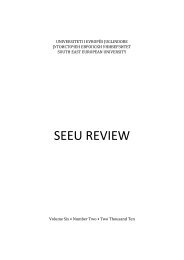SEEU Review vol. 5 Nr. 2 (pdf) - South East European University
SEEU Review vol. 5 Nr. 2 (pdf) - South East European University
SEEU Review vol. 5 Nr. 2 (pdf) - South East European University
Create successful ePaper yourself
Turn your PDF publications into a flip-book with our unique Google optimized e-Paper software.
<strong>SEEU</strong> <strong>Review</strong> Volume 5, No. 2, 2009<br />
content of these principles, and brings out one way in which either a privateproperty<br />
economy or a socialist regime can satisfy this conception of justice”<br />
(Rawls, 1971, 309).<br />
It is true that the imperfections of the market violates the precepts of<br />
justice, but this precept is only one norm among many other secondary<br />
norms and what significantly matters is “the working of the whole system<br />
and whether these defects are compensated for elsewhere” (Rawls, 1971,<br />
309). At this point, it should be noted that Rawls” principles of justice can be<br />
realised by private property based economy or a socialist economy. Rawls<br />
separates political liberalism from free market economy, implying that<br />
political liberalism does not necessarily requires private property economy.<br />
This can be accepted if we recall that socialist economy has still class<br />
divisions and interests.<br />
Nevertheless, Rawls favours the competitive schema, which<br />
“gives scope for the principles of free association and individual choice<br />
of occupation against a background of fair equality of opportunity… A basic<br />
prerequisite is the compatibility of economic arrangements with the<br />
institutions of liberty and free association. Thus if markets are reasonably<br />
competitive and open, the notion of pure procedural justice is a feasible one<br />
to follow” (Rawls, 1971, 310).<br />
In order to maintain his theory, Rawls tries to operate the priority rule.<br />
First, the liberty is guaranteed, second the fair equality of opportunity is<br />
provided and finally the difference principle is set in motion for the benefits<br />
of the least favoured groups in the general conception of justice as fairness.<br />
Concluding Remarks<br />
In his web site article, “The politics of John Rawls”, Paul Treanor<br />
crticises Rawls’ theory of justice and his liberalism. (Treanor, 2003). “This<br />
whole approach is flawed …. it includes morally arbitrary choices, which are<br />
concealed by Rawls style.”. Rawls suggests his original position in the form<br />
of assembly. Treanor asks: ‘there is only one assembly. Why only one?”.<br />
“There is only one social contract. Why not different (multiple) versions?”.<br />
Also, Rawls assumes non-migration. “if there were multiple social contracts,<br />
then some people could live under different versions, in the course of their<br />
lives. If there were multiple contracts and migration, then the migration can<br />
be <strong>vol</strong>untary. This introduces the element of real-life <strong>vol</strong>untarism into<br />
27

















